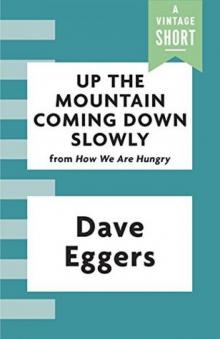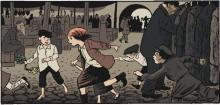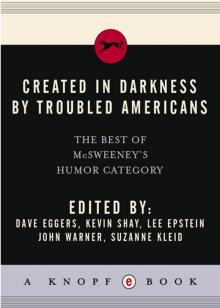- Home
- Dave Eggers
Zeitoun Page 5
Zeitoun Read online
Page 5
Nademah got in the front seat and put on her seatbelt.
“Bye bye,” Kathy said, backing out. “See you Sunday.”
And they were gone, the girls waving as they left.
He didn’t go that Friday, but after that, he no longer doubted Kathy’s resolve. He knew she was serious—that in the future he’d be consulted on vacation plans, but that trips to Florida or beyond could and would happen with or without him. So over the years there were other trips to Destin, and he even made it on a few of them.
But always his decision was made at the last minute. One time Kathy was late in getting started, and he was so late in deciding that he couldn’t even pack. She was in the driveway, backing out, when he pulled in.
“Now or never,” she said, barely stopping the car.
And so he jumped in the car. The girls giggled to see their dad in the back seat, still in his work clothes, dirty and sweating—as much from the stress of the decision as from the day’s work. Zeitoun had to buy beach clothes when they got to Florida.
Kathy was proud that she’d gotten him to Destin once a year. Zeitoun didn’t mind going too much because, given how close it was, he knew he could come back at any time—and more than once, he had cut a vacation short because of some problem at one of the work sites.
By 2002, though, Kathy wanted something that really felt like a vacation. And she knew she had to do something drastic. In all their time together—eight years at that point—he had never taken more than two days off in a row. She knew that she had no choice but to kidnap him.
She started by planning a weekend in Destin. She chose a weekend when she knew things would be calm at work; it was just after Christmas, and there was rarely much work till well after New Year’s. As usual, Zeitoun wouldn’t commit till the last minute, so she took the precaution of actually packing a bag for him and hiding it in the back of the minivan. Because she had made sure the weekend was quiet, he came along—as always, at the last minute. Kathy told him she’d drive, and because he was exhausted, he agreed. She made sure the kids were quiet—they were in on the plan—and he soon fell asleep, drooling on his seatbelt. While he slept, Kathy drove right on through Destin and onward down the paunch of Florida. Each time he woke up she would say, “Almost there, go back to sleep,” and thankfully he would—he was so tired—and it wasn’t until an hour north of Miami that he realized they weren’t going to Destin. Kathy had driven straight down to Miami. Seventeen hours. She’d checked on the computer for the warmest place in the country that week, and Miami was it. Being that far away was the only way to ensure he would take a real vacation, a full week’s worth of rest. Every time she thought back on the gambit, and how well it had worked, Kathy smiled to herself. A marriage was a system like any other, and she knew how to work it.
At about two-thirty, Ahmad called Zeitoun again. He was still tracking the storm from his computer in Spain.
“Doesn’t look good for you,” he said.
Zeitoun promised he would keep watch on it.
“Imagine the storm surge,” Ahmad said.
Zeitoun told him he was paying close attention.
“Why not leave, just to be safe?” Ahmad said.
Kathy decided to go to the grocery store before picking up the girls from school. You could never tell when people would make a run on the basics before a storm arrived, and she wanted to avoid the crush.
She went to the mirror to adjust her hijab, brushed her teeth, and left the house. Not that she thought about it much, but any trip to the grocery store or the mall presented the possibility that she would encounter some kind of ugliness. The frequency of incidents seemed tied, to some extent, to current events, to the general media profile of Muslims that week or month. Certainly after 9/11 it was more fraught than before, and then it had calmed for a few years. But in 2004 a local incident had stoked the fire again. At West Jefferson High School, a tenth grader of Iraqi descent had been repeatedly harassed by her history teacher. He had called Iraq a “third-world country,” had worried that the student would “bomb us” if she ever returned to Iraq. In February of that year, while passing out tests, the teacher had pulled back the girl’s hijab and said, “I hope God punishes you. No, I’m sorry, I hope Allah punishes you.” The incident was widely reported. The student filed a lawsuit against him, and his termination was recommended by the Jefferson Parish School District superintendent. The school board overruled; he was given a few weeks’ suspension and returned to the classroom.
After the decision, there had been an uptick in minor harassment of Muslims in the area, and Kathy was aware of the invitation she was providing in going out in her hijab. There was a new practice in vogue at the time, favored by adolescent boys or those who thought like them: sneak up behind a woman wearing a headscarf, grab it, and run.
One day it happened to Kathy. She was shopping with Asma, a friend who happened to be Muslim but who wore no hijab. Asma was originally from Algeria, and had been living in the U.S. for twenty years; she was usually taken for Spanish. Kathy and Asma were leaving the mall, and outside, Kathy was trying to remember where she’d parked her car. She and Asma were on the sidewalk, Kathy squinting at the rows of gleaming cars, when Asma gave her a funny look.
“Kathy, there’s a girl behind you—”
A girl of about fifteen was crouched behind Kathy, her arm raised, about to yank the hijab off Kathy’s head.
Kathy cocked her head. “You got a problem?” she barked.
The girl cowered and slunk away, joining a group of boys and girls her age, all of whom had been watching. Once back with her friends, the girl directed some choice words Kathy’s way. Her friends laughed and echoed her, cursing at Kathy in half a dozen different ways.
They could not have expected Kathy to return the favor. They assumed, no doubt, that a Muslim woman, presumably submissive and shy with her English, would allow her hijab to be ripped from her head without retaliation. But Kathy let loose a fusillade of pungent suggestions, leaving them dumbfounded and momentarily speechless.
On the drive home, even Kathy was shocked by what she’d said. She had been brought up around plenty of cursing, and knew every word and provocative construction, but since she’d become a mother, since she’d converted, she hadn’t sworn more than once or twice. But those kids needed to learn something, and so she’d obliged.
In the weeks after the attacks on the Twin Towers, Kathy saw very few Muslim women in public. She was certain they were hiding, leaving home only when necessary. In late September, she was in Walgreens when she finally saw a woman in a hijab. She ran to her. “Salaam alaikum!” she said, taking the woman’s hands. The woman, a doctor studying at Tulane, had been feeling the same way, like an exile in her own country, and they laughed at how delirious they were to see each other.
* * *
On this day in August, the grocery-store trip went off without confrontation, and she picked up her girls.
“You hear about the storm?” Nademah asked.
“It’s coming toward us,” Safiya added from the back seat.
“Are we going to leave?” Nademah asked.
Kathy knew that her kids wanted to. They could go to one of their cousins’ homes, in Mississippi or Baton Rouge, and it would be a vacation, a two-day sleepover. Maybe school would be canceled on Monday as the city cleaned up? This was surely what they were thinking and hoping. Kathy knew the workings of her children’s minds.
When they got home, it was five o’clock and Katrina was all over the news. The family watched footage of enormous waves, uprooted trees, whole towns washed grey with torrential rain. The National Hurricane Center was suggesting that Katrina would soon become a Category 3. Governor Blanco held a press conference to declare a state of emergency for Louisiana. Governor Barbour did the same for Mississippi.
Kathy was rattled. Sitting on the arm of the couch, she was so distracted that soon it was six o’clock and she hadn’t started dinner. She called Zeitoun.
 
; “Can you get Popeyes on your way home?” she asked.
At home, Nademah arranged the tablecloth and placemats. Safiya and Aisha set out the silverware and glasses. Kathy threw together a salad and poured milk for the kids and juice for herself and Zeitoun.
Zeitoun arrived with the chicken, showered, and joined the family for dinner.
“Finish, finish,” he said to his daughters, who were picking at their food, leaving huge swaths of it uneaten.
He had gotten used to it after all these years, but still, there were times when the waste got to him. The disposability of just about everything. Growing up in Syria he had often heard the expression “If your hand doesn’t work for it, your heart doesn’t feel sorry for it.” But in the U.S., it wasn’t just the prosperity—because New Orleans was not uniformly prosperous, to be sure—there was a sense that everything could be replaced, and on a whim. In his children he was trying to instill a sense of the value of work, the value of whatever came into their house, but he knew that much would be lost in the context, the waste and excess of the culture at large. He had been brought up to know that what God hates as much as anything is waste. It was, he had been told, one of the three things God most hated: murder, divorce, and waste. It destroyed a society.
After dinner the girls asked if they could watch Pride and Prejudice again. It was Friday night, so Zeitoun had no school-related reasons to block the movie. Still, it didn’t mean he had to sit and watch it again. He’d liked the movie fine the first time, but the need to watch it a dozen times in as many days was beyond him. In the past week, he and Zachary had retired to other rooms to do something, anything, else. Kathy, though, was right there with the girls each time, and this time all of them draped over each other on the couch, misting up at the same parts they always did. Zeitoun shook his head and went into the kitchen to fix a cabinet door that had gotten loose.
All evening they paused the movie to watch the news reports about the storm’s intensity and direction. Still moving slowly, the hurricane was heading up the coast with winds over one hundred miles per hour. The longer it lingered over any region, the more destruction it would bring. All the news was terrible, and when Kathy saw the picture of the family of five she was ready to turn it off. She was sure they were gone, and she would obsess over this family for weeks, thinking about all their relatives gathered for the reunion, now forced to mourn the loss of so many at once—but then Kathy realized that the family was not lost. She turned up the volume. They had been rescued. They had docked their boat on a mangrove island near Ten Thousand Islands, and had ridden out the storm in the cabin of the yacht, praying and taking turns climbing up to look for help in the skies. Just hours earlier, the Coast Guard had spotted their boat and lifted them all to safety. The family of five had been saved.
Later, after kissing Zachary goodnight, Kathy lay down in Nademah’s bed and the girls arranged themselves around her, a mess of overlapping limbs and pillows.
“Who wants to start?” Kathy asked.
Safiya began a story about Pokémon. The stories, which the girls told collaboratively, were often about Pokémon. After Aisha introduced the protagonist, Safiya provided the setting and central conflict, and Nademah took it from there. They continued, taking turns advancing the plot, until Aisha was asleep and Nademah and Safiya were drifting off. Kathy looked up to find Zeitoun in the doorway, leaning against the frame, watching them all. He did this often, just watching, taking it all in. The scene was almost too much, too beautiful. It was enough to burst a man’s heart wide open.
SATURDAY AUGUST 27
Zeitoun and Kathy woke late, after eight. When they turned on the TV they saw Michael Brown, director of the Federal Emergency Management Agency, telling all residents of New Orleans to leave as soon as they could, to head inland with all possible haste. The National Hurricane Center had issued a watch for central Louisiana and warned that the hurricane could become a Category 5 by the time it made landfall. Category 5 hurricanes had only struck the United States mainland three times before, and never New Orleans.
“Honey,” Kathy said, “I think we should go.”
“You go,” Zeitoun said. “I’ll stay.”
“How can you stay?” she asked.
But she knew the answer. Their business wasn’t a simple one, where you could lock an office door and leave. Leaving the city meant leaving all their properties, leaving their tenants’ homes, and this they couldn’t do unless absolutely necessary. They had job sites all over the city, and any number of things could happen in their absence. They would be liable for damage if their equipment caused harm to clients’ property. It was yet another hazard of the company they’d built.
Kathy was leaning strongly toward fleeing, and watching the news throughout the day it seemed that there were so many new indicators that this storm was unique that she didn’t feel she could even contemplate staying in the city. They’d already closed down most operations at Louis Armstrong International Airport. The Louisiana National Guard had called four thousand troops into service.
Mid-morning, it was at least ninety-five degrees, the air leaden with humidity. Zeitoun was in the backyard, running around with the kids and Mekay, the dog. Kathy opened the back door.
“You’re really staying?” Kathy asked him. Somehow she thought that he might be wavering. She was wrong.
“What’re you worried about?” he said.
She wasn’t worried, in fact. She didn’t fear for her husband’s safety, really, but she did have the feeling that life in the city would be very trying during and after the storm. The electricity would go. The roads would be covered with debris, impassable for days. Why would he want to struggle through all that?
“I have to watch the house,” he said. “The other houses. One small hole in the roof—if I fix it, no damage. If not, the whole house is wrecked.”
By the early afternoon Mayor Nagin and Governor Blanco had called for a voluntary evacuation of the city. Nagin told residents that the Superdome would be open as a “shelter of last resort.” Kathy shuddered at the thought; the year before, with Hurricane Ivan, that plan had been a miserable failure. The Superdome had been ill-supplied and overcrowded then and in ’98, with Hurricane Georges. She couldn’t believe the place was being used again. Maybe they’d learned from the last time and better provisioned the stadium? Anything was possible, but she was doubtful.
Kathy planned to leave as soon as the contraflow took effect, supposedly around four o’clock. The contraflow would allow all lanes of every highway to flow outward from the city. By then Kathy would have the Odyssey packed and ready in the driveway.
But where would she be going? She knew well that every hotel within two hundred miles would be booked already. So it was a matter of deciding which family member she’d impose on. She had thought first of her sister Ann, who lived in Poplarville, Mississippi. But when she called, Ann was considering leaving, too. Her home was technically within the area that would be affected by the high winds, and it was surrounded by old trees. Given the likelihood that one of them might fall through her roof, Ann wasn’t sure she should stay there herself, let alone with Kathy and her kids.
The next option was the family headquarters in Baton Rouge. Owned by her brother Andy, it was a three-bedroom ranch in a subdivision outside the city. Andy traveled frequently and was currently in Hong Kong, working on a construction project. While he’d been gone, two of Kathy’s sisters, Patty and Mary Ann, had moved in.
Kathy knew they would allow her family to stay, but it would be cramped. The house wasn’t so big to begin with, and Patty had four kids of her own. With Kathy’s family there, all told there would be eight kids and three sisters living together in a house that would likely lose electricity in the high winds.
Still, it had been some time since the families had gotten together. This might bring them closer. They could all eat out, maybe go shopping in Baton Rouge. Kathy knew her kids would endorse the plan. Patty’s kids were older, but they got
along well with the Zeitouns, and anyway, eight kids always found something to do together. It would be cramped and loud, but Kathy found herself looking forward to it.
Throughout the afternoon, Kathy tried to convince her husband to come with them. When had officials suggested an all-city evacuation before? she asked. Wasn’t that reason enough to go?
Zeitoun agreed that it was unusual, but he had never evacuated before and he saw no need to do so now. Their home was elevated three feet above the ground, and rose two stories on top of that, so there would be no danger of getting stuck in an attic or on a roof, even if the worst happened. Zeitoun could always retreat to the second floor. And they lived nowhere near any levees, so they wouldn’t get any of the flash flooding that might hit some of the other neighborhoods. It was East New Orleans, or the Lower Ninth, with its one-story houses so close to the levees, that were in the gravest danger.
And he certainly couldn’t leave before he secured all his job sites. No one else would do it, and he wouldn’t ask anyone else to do it. He’d already told his workers and his foremen to leave, to be with their families, to get a head start on the traffic. He planned to go to every one of the nine job sites to gather or tie down his equipment. He had seen what happened when a contractor failed to do this: ladders careening through windows and walls, tools damaging furniture, paint all over the lawn and driveway.
“I better go,” he said.
He set out, visiting the work sites, tying down ladders, packing up tools, brushes, loose tiles, Sheetrock. He was through about half the sites when he headed home to say goodbye to Kathy and the kids.
Kathy was loading up a few small bags in the back of the Odyssey. She had packed enough clothes, toiletries, and food for two days. They would return on Monday night, she figured, after the storm had come and gone.
Kathy had the minivan’s radio on and heard Mayor Nagin repeat his instructions for residents to leave the city, but she noted that he had stopped short of a mandatory evacuation. This would embolden her husband, she was certain. She switched to another station, where they were issuing a warning that anyone who planned to ride out the storm in New Orleans should be prepared for a flood. Levee breaches could happen, they said. Storm surges might cause flooding. Ten or fifteen feet of water would be a possibility. Any diehards staying home should have an axe, in case they needed to chop through their attic to reach the roof.

 A Hologram for the King
A Hologram for the King Heroes of the Frontier
Heroes of the Frontier A Heartbreaking Work of Staggering Genius
A Heartbreaking Work of Staggering Genius The Best American Nonrequired Reading 2013
The Best American Nonrequired Reading 2013 How We Are Hungry
How We Are Hungry The Circle
The Circle What is the What
What is the What The Museum of Rain
The Museum of Rain The Captain and the Glory
The Captain and the Glory Up the Mountain Coming Down Slowly
Up the Mountain Coming Down Slowly The Parade
The Parade The Monk of Mokha
The Monk of Mokha Your Fathers, Where Are They? And the Prophets, Do They Live Forever?
Your Fathers, Where Are They? And the Prophets, Do They Live Forever? You Shall Know Our Velocity
You Shall Know Our Velocity The Wild Things
The Wild Things 2006 - What is the What
2006 - What is the What The Best American Nonrequired Reading 2011
The Best American Nonrequired Reading 2011 Created in Darkness by Troubled Americans
Created in Darkness by Troubled Americans